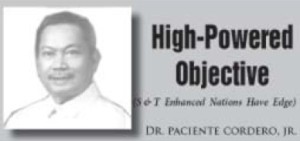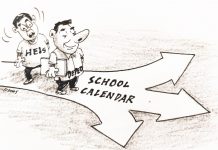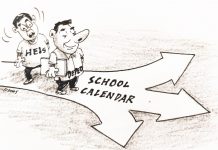Sometime in 2013, a Lawmaker offered his one-cent explanation in response to the question posted above. He quipped by saying “We have a lot of problems in the country’s science education. One of them is the shortage of teachers who have a background in science.” The lawmaker is at least thinking, but nobody knows how he has responded as member of the law-making body? The lawmaker’s woe was echoed by a lady newcomer to Batasan who aptly noted that the DepEd needs 82 thousand new teachers. Of these, the science teachers include Math/Statistics (7,257), Advance Match (609), Physical Science (6,313), and Life Science (5,707) or a whooping number close to 20,000 science-oriented teachers that DepEd is faced to handle Senior High School students under the K to 12 Program. The next question in need of a prompt answer is :How many of the current (2013) 70,672 new elementary and high school students will be getting into science education? If it is any indication, the off-campus of the Eastern Visayas State University-Burauen has an encouraging population of BSED in Science Education – potential science teachers? I feel happy to help mould their minds along science having been ‘approached’ by the Education Department Head to teach Life science subjects during this 2nd semester.
The situation reminded me one of the Editorials that I wrote as ‘Guest Editor’ of a Department of Science and Technology. I was then Executive Director of the DOST Sectoral Council for Basic Research – the National Research Council of the Philippines (NRCP). The titles of the editorial were : “ S & T Issues In Need of Appropriate Legislations ” and “S & T : Key to Economic Development”. The DOST publication is distributed to its Regional; Offices and all Provincial S & T Centers, including libraries of SUCs, HEIs, government, and non-government agencies. I would like to believe that some serious and literate lawmakers received a copy of the issue and reacted to the challenge! The principal S & T Issue and subject of the said editorial were to urge the national leadership then to use a “bigger bucket” in appropriating annual budget for agencies such as DOST, Department of Agriculture (especially BFAR), DENR , and other research agencies of government to enhance R & D to tap and convert into consumer products the country’s rich agricultural resources. The common denominator is still sufficient and sustained funding support. Those of us who still believe in ‘research making a difference’ , should be spared of the problem of securing funding support in our desire to contribute to the economic advancement of the Philippines.
Of course, the science sector elected (in our second attempt) one Legislator via AGHAM Party-List, but could only stay for one term and left with hardly a dent of legislations on science and technology. We, in the science community did pin much hope on our one-term science representative cause we missed the chance to put our first candidate, an established Filipino scientist in the person of DR. EMIL Q. JAVIER. Devoid of financial support, our most qualified AGHAM Party-List failed to enter the halls of congress. Our second attempt saw one successful candidate gaining the title of The Honorable, but sadly he was not armed scientifically and technologically. (to be continued).
ooo000ooo
NEXT TOPIC : Part II – Off-shot of Revised Basic Education Curriculum (K-12)
SHARE S & T THOUGHTS through E-mail: drpacjr@yahoo.com.




